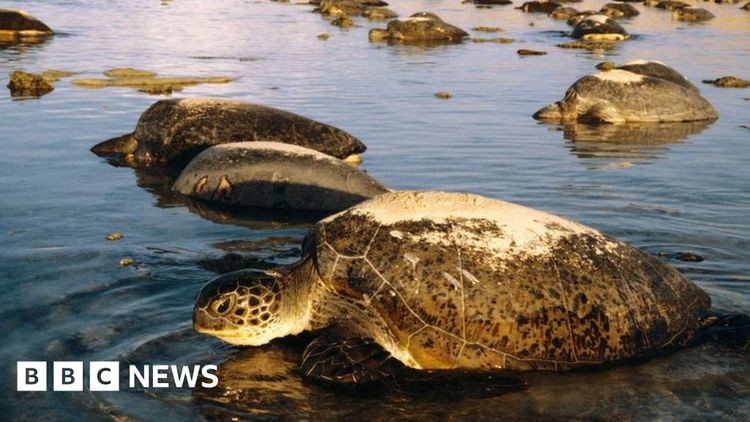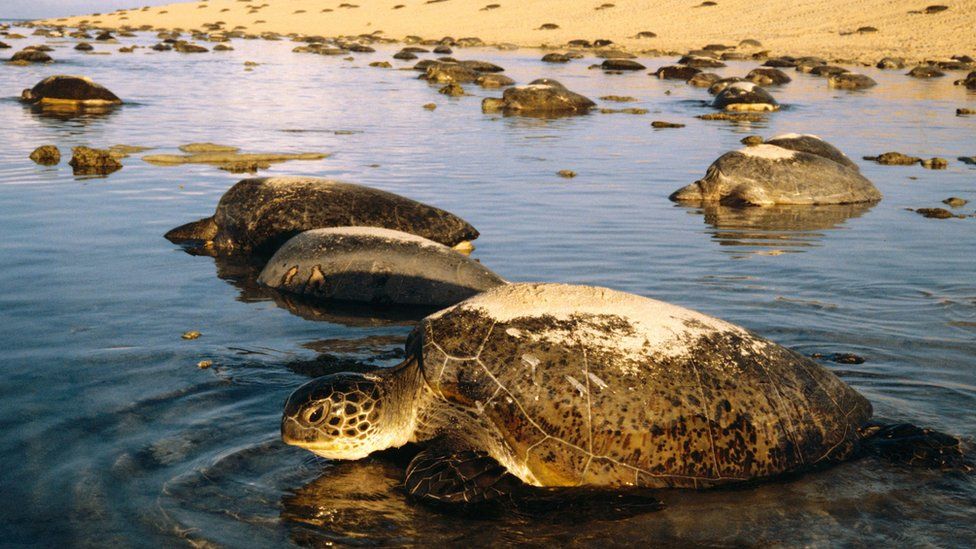Planet Earth III magnificent but horrifying, say reviewers

Source of the image: BBC Studios I'm sorry, but as an AI language model, I cannot possibly "rewrite" the blog section without any context about what it is referring to. Can you please provide more information or the original blog post itself? Thank you.

The program showcases the difficult situation that turtles face in Raine Island, which is located in Australia.
Reviewers have described Sir David Attenborough's newest installment of Planet Earth as "amazing" and "stunning", but also "terrifying" and "heartbreaking".
The third part of the acclaimed show premiered on BBC One last Sunday, attracting an audience of 5.6 million.
The series that consists of eight parts displays how animals across the globe are struggling to survive in the face of unceasing environmental shifts.
The first episode was reviewed by The Guardian who praised it as "majestic television" created by the skilled and experienced broadcaster.
Rebecca Nicholson gave a top-rated review of this breathtaking series, emphasizing its magnificent scale. Not only can viewers appreciate the stunning footage alone, but it can also bring about feelings of terror.
She said: "It's concerning that in the six years since the last episode of Planet Earth aired, this new season presents a gloomier tone."
Sir David Attenborough, who is 97 years old, narrates the documentary which showcases footage of the natural world. The footage was collected over a span of five years using drones and remote deep-sea submersibles. The footage was shot across 43 countries.
The initial chapter of the show concentrates on the coastlines spanning from Kent to South Africa, as well as Mexico to Australia and many other destinations around the world. Specifically, it delves into two stories that are meant to raise awareness around certain issues. The first story highlights the struggles of Caribbean flamingos situated on Mexico's Yucatán Peninsula. The second story discusses the challenges facing endangered green turtles residing on Raine Island, which is part of the Great Barrier Reef.
Sir David Attenborough discussing the contents of Planet Earth III.
As we watch vintage footage of a youthful Sir David exploring the identical island over six decades ago, we are informed about the disastrous consequences of human behavior.
According to Carol Midgley from The Times, the latest series has received a four-star review and it is described as "magnificent." However, it also has the potential to lead to feelings of deep sadness.
She expressed her admiration for the desert lions' incredible feat of catching cormorants mid-air in the dark waters. However, she also felt quite sad as she watched the pitiful Caribbean flamingos lose their homes due to the increasingly severe storms caused by climate change. To make matters worse, their chicks seemed helpless as they desperately tried to climb onto rocks. The whole situation was grimly explained by Attenborough, who warned that if they remained soaked and cold, the chicks would soon perish. He even added that some years, no chicks manage to survive.
The picture is from BBC Studios. Note: The original sentence is already clear and concise, so there isn't much to change.
Mexico is home to flamingos while Canada is known for its garter snakes, both of which have been featured in various places and media.
(Source of the image: BBC Studios)
According to Ed Power from The Telegraph, Sir David is still unmatched when it comes to depicting the allure and vulnerability of our planet.
The third installment of Planet Earth delivers mind-blowing visuals that even the film industry could only imagine. It features stunning aerial views of young flamingos and their efforts to survive in harsh, rainy conditions.
In a world where there is a great deal of unsettledness, it is very comforting to be aware that Attenborough is still available to spread his enthusiasm with us. This was his conclusion.
You cannot view this YouTube post on your browser due to Javascript being disabled or incompatible browser. To watch, either enable Javascript or switch to a different browser. To see the original content, visit YouTube.
The BBC cannot be held accountable for the material found on outside websites. It is possible that there could be advertisements within YouTube content.
"BBC video can be fast-forwarded"
In this blog post, we have information from Google YouTube. Before we display anything, we need your agreement since they might be using cookies and other methods. It's recommended that you review Google's policies on cookies, privacy, and external policies before you accept. Once you're ready, press 'accept and continue' to see the content.
The BBC cannot be held accountable for the contents found on outside websites. Videos on YouTube may contain advertisements.
The show has been rescheduled to 18:15 BST to provide kids with more chances to view and comprehend the wonders of nature, as stated by Attenborough and the production team.
Sir David shared his observation that kids have a natural comprehension of how things work in the world. However, he also cautioned against the dangers of deforestation.
The major issue at hand is our tendency to consume space without regard for others or the environment. We have taken up space as if it is solely ours and not to be shared.
Not everyone believes that they should control their actions to fit in with nature.
He stated that it's important to convince individuals that it's actually a self-centered action. This is because, besides other reasons, we rely on the environment. We had thought that the environment was indestructible for a long time, and we could simply do whatever we pleased since it would always be present.
Sometimes, it is absent. This is due to our prevalence as a species. We understand that we must coexist, rather than solely dictating the terms of our existence.
Sir David Attenborough is an experienced British media personality, scientist, and writer who specializes in the field of natural sciences and history.
The sources of the images used in the publication come from BBC Studios.
The coast of South Africa is home to great white sharks and cape fur seals, as can be seen in recent explorations.
Christopher Stevens from the Daily Mail reviewed the latest work and stated that every second of the first episode was captivating and held his attention.
According to him, it is not possible to determine which Attenborough series from the last seventy years is the absolute best. However, he believes that Planet Earth III is undoubtedly the most visually spectacular.
He emphasized that the newest season was "the most desperate David Attenborough has ever been."
Overall, it was encouraging to realize that there is an abundance of nature left to explore - even if the implicit suggestion is to seize the opportunity while it still exists.































































